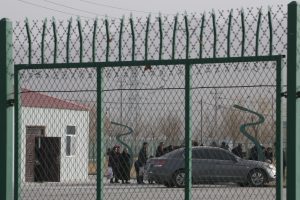With just over a year to go until the 2022 Winter Olympics, the clock is ticking for the International Olympic Committee (IOC) to ensure it does not repeat the same mistake it made in 2008 by effectively endorsing China’s failure to improve human rights.
A few weeks ago we – a Tibetan, Uyghur, Hong Konger, and Chinese rights lawyer – met with IOC representatives to share a collection of painful evidence of the extreme abuses that we have endured at the hands of the Chinese government, and to urge the IOC to reverse its mistake in awarding Beijing the honor of hosting such a prestigious event as the Winter Olympic Games in 2022.
We shared first-hand information from the frontline of China’s rights crackdown: the painful loss of contact with Uyghur relatives and friends and the fears that they may be among the millions held in camps or forced labor facilities; the deep impact of Xi Jinping’s policy of “absolute control” that is ripping families apart in Tibet; the kidnapping and abuse of those who have sought freedom by China’s secret police; and the chilling reality that many people are too fearful to return home because we would face imprisonment, torture, and even death in Chinese custody.
We left the meeting feeling that despite the representatives being clearly moved by our personal stories, the IOC was prepared to continue ignoring the fact that their chosen 2022 Olympic host is carrying out the most heinous crimes against humanity, blatantly refusing to see the situation as problematic and maintaining the age old rhetoric that this isn’t about “politics,” but rather about the “Olympic movement.”
Our concerns for the IOC’s failure were further exacerbated when, shortly after our meeting, the IOC’s president, Thomas Bach, attempted to gloss over the historical realities by stating that the Olympics are solely about diversity and unity, not politics and profit. Bach surmised that the Olympic Games are “politically neutral,” which couldn’t be further from the truth. Rather than being apolitical, history has shown us that time and time again, the Olympic Games have been used as propaganda platforms to prop up dangerous political systems. In 1936 Adolf Hitler used the Berlin Games as a propaganda coup to portray the Nazis as tolerant, and in 2008 China used the Beijing Summer Games as a pretext to intensify its brutal practices and policies, which have led to increased and widespread violation of human rights.
The reality is that the relationship between the Olympic Games and politics is now, and has always been, acutely visible and this has not gone unnoticed by the Chinese Communist Party. While the IOC remains in denial, China is once again preparing to use the 2022 platform as part of its “soft power” arsenal to help roll out a sophisticated strategy aimed at reshaping and influencing public opinion in an attempt to hide the gross and increasing assault on those living under its rule.
But at the same time, there is a growing movement amongst governments and elected officials who are facing up to the reality and are expressing support for a diplomatic boycott of the Beijing 2022 Games in the knowledge that they cannot once again help bolster China’s authoritarian regime as happened in 2008.
Despite the ticking clock, there is still time for the IOC to decide to stand on the right side of history; will it abide by the Olympic Charter’s core principles of “human dignity” and use the Olympic platform for the good of humanity, or will it endorse one of the world’s most brutal regimes in its efforts to crush any remaining dissent by hosting a “Genocide Games”?
Dorjee Tseten, a Tibetan living in exile in the U.S., is the executive director of Students for a Free Tibet and elected member of Tibetan Parliament in exile. On Twitter: @Dotseten
Zumretay Arkin, a Uyghur-Canadian, is the program and advocacy manager of World Uyghur Congress. On Twitter: @ZumretErkin
Teng Biao 滕彪 is a Chinese human rights lawyer, scholar, and activist, living in exile in the U.S. On Twitter: @tengbiao
Frances Hui, a Hong Kong activist and founder of We The Hongkongers is based in the U.S.

































